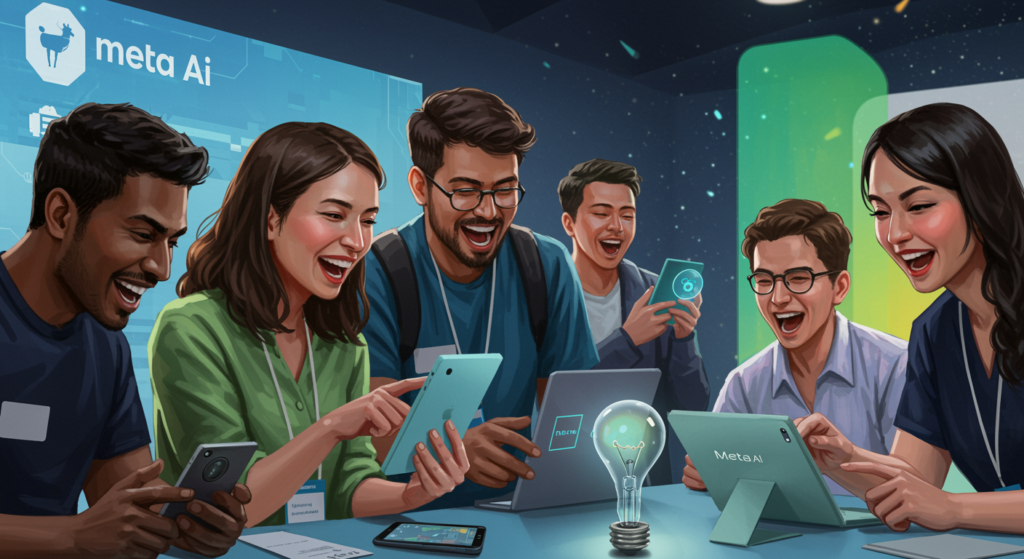
Meta’s New AI Tools Unveiled at LlamaCon Event
Exploring LlamaCon’s Debut
LlamaCon burst onto the scene as Meta’s first major AI-focused event on April 29, 2025, drawing developers and tech enthusiasts eager for fresh innovations. This gathering wasn’t just another conference; it highlighted Meta’s push to challenge giants like OpenAI through open-source AI advancements. Imagine sitting in on discussions between Meta’s CEO Mark Zuckerberg and Microsoft’s Satya Nadella, where they debated how collaborative efforts could speed up AI progress—what if your next app could stem from these ideas?
The event emphasized Meta’s dedication to making AI accessible, with a spotlight on new tools for developers. By fostering an open-source community, LlamaCon aimed to inspire creators to build smarter, more efficient applications. This approach could reshape how we think about AI development, turning everyday problems into solvable challenges with the right tools at hand.
New AI Tools and Features from LlamaCon
At the core of LlamaCon’s excitement were the fresh AI tools Meta rolled out, designed to simplify and accelerate development. These features build on Meta’s Llama ecosystem, offering practical solutions for both pros and newcomers. Have you ever wished for an API that lets you test AI models without a steep learning curve? That’s exactly what Meta delivered.
Llama API: A Developer’s Gateway
The Llama API stole the show at LlamaCon, entering a limited free preview that lets developers dive into models like Llama 3.3 8B right away. This tool isn’t just about access; it’s about empowerment, with features like one-click API key creation and intuitive playgrounds for experimenting with models. For instance, if you’re building a chatbot, the Python and Typescript SDKs make integration seamless, almost like piecing together a puzzle.
What’s more, its compatibility with the OpenAI SDK means you can switch tools without starting from scratch, saving time and frustration. Meta’s partnerships with Cerebras and Groq promise faster inference for upcoming Llama 4 models, potentially cutting processing times in half. As a developer, this could mean turning ambitious ideas into reality faster than ever—think about creating AI-driven apps that respond in real-time to user queries.
Meta AI App: Bringing AI to Everyone
Alongside the Llama API, Meta introduced the standalone Meta AI app, powered by the cutting-edge Llama 4 models. This app flips the script by putting AI in the hands of everyday users, with options for text, voice interactions, and even image generation. Picture editing a photo with simple voice commands—it’s that intuitive and fun.
Unlike Meta’s other platforms, this app stands alone, making AI more approachable without the need for logins to Facebook or WhatsApp. It’s a smart move for boosting consumer adoption, as it lets people experiment with AI in their daily lives. If you’ve been curious about how AI can simplify tasks like brainstorming or creative editing, this app might just be the game-changer you’ve waited for.
Implications of LlamaCon for AI Innovation
LlamaCon’s announcements signal a bold step forward in AI innovation, emphasizing how tools like the Llama API can spark widespread creativity. By focusing on developer engagement, Meta is building a ecosystem where collaboration drives progress. But what does this mean for the bigger picture?
Enhanced developer tools from LlamaCon could lead to a surge in custom AI applications, from personalized assistants to advanced analytics. In a competitive landscape filled with players like DeepSeek, Meta’s open-source strategy stands out, encouraging a community where ideas flow freely. This not only fosters innovation but also raises questions: How might these tools influence your own projects, making them more efficient and impactful?
Future Prospects and Challenges Post-LlamaCon
While LlamaCon highlighted promising advancements, the road ahead isn’t without hurdles. Meta’s previous Llama models, such as Llama 4, faced mixed feedback, with benchmarks not always meeting expectations. This underscores the need for ongoing improvements to keep developers loyal and excited.
Looking forward, collaborations like those with Cerebras and Groq could propel AI speeds, but challenges like ensuring model accuracy and ethical use remain. Meta’s commitment to responsible AI, including new protection tools and a defenders program, aims to address these issues. If you’re in the AI space, consider how adopting these tools might help you navigate similar obstacles—perhaps by joining Meta’s open-source community for shared insights.
Key Takeaways from LlamaCon
From LlamaCon, one clear takeaway is Meta’s focus on protecting AI through initiatives like the Defenders Program, which promotes safe usage among partners. Another highlight is the emphasis on industry collaborations, such as with Cerebras and Groq, to push boundaries in AI performance.
Mark Zuckerberg’s reaffirmation of open-source AI at LlamaCon reinforces Meta’s vision for inclusive innovation. These elements combine to make LlamaCon not just an event, but a catalyst for change, inviting developers to contribute and shape the future. What steps could you take to leverage these insights in your work?
Why Engage with LlamaCon’s Innovations?
In a world where AI is evolving rapidly, events like LlamaCon offer valuable opportunities to stay ahead. By integrating tools like the Meta AI app, users and developers alike can explore new possibilities, from quick voice queries to complex model tuning. This engagement isn’t just about tech—it’s about making AI work for you in real, meaningful ways.
For example, imagine using the Llama API to develop an app that analyzes market trends for small businesses. Such applications could democratize AI, allowing more people to benefit from advanced tech. If you’re a developer, this might prompt you to experiment with free previews and share your experiences with others.
Tips for Getting Started with LlamaCon Tools
If LlamaCon’s announcements have piqued your interest, here’s some actionable advice to dive in. First, sign up for the Llama API preview and explore its SDKs to test basic integrations—start small, like building a simple text generator. Secondly, download the Meta AI app and play with its features; it’s a great way to see AI in action without any coding.
Remember to check Meta’s resources for best practices on ethical AI use, which can help avoid common pitfalls. By applying these tips, you could turn LlamaCon’s innovations into practical solutions for your projects. Have you tried similar tools before, and what challenges did you face?
In wrapping up, Meta’s LlamaCon event showcases how AI tools can bridge gaps between developers and consumers, paving the way for exciting advancements. If you’re passionate about AI, I encourage you to try these features, share your thoughts in the comments below, and explore more on our site for related insights. What are your takeaways from this development—how might it shape your approach to tech?
References
- AI Meta Blog. (2025). LlamaCon and Llama News. Link
- Engadget. (2025). LlamaCon 2025 Live Updates. Link
- Corporate Event News. (2025). Meta Launches LlamaCon. Link
- Constellation Research. (2025). Meta Launches Llama API and Meta AI App. Link
- TechCrunch. (2025). Meta at LlamaCon. Link
LlamaCon, Meta AI, Llama API, AI innovation, AI tools, developer engagement, Llama ecosystem, open-source AI, Meta Llama models, AI advancements







